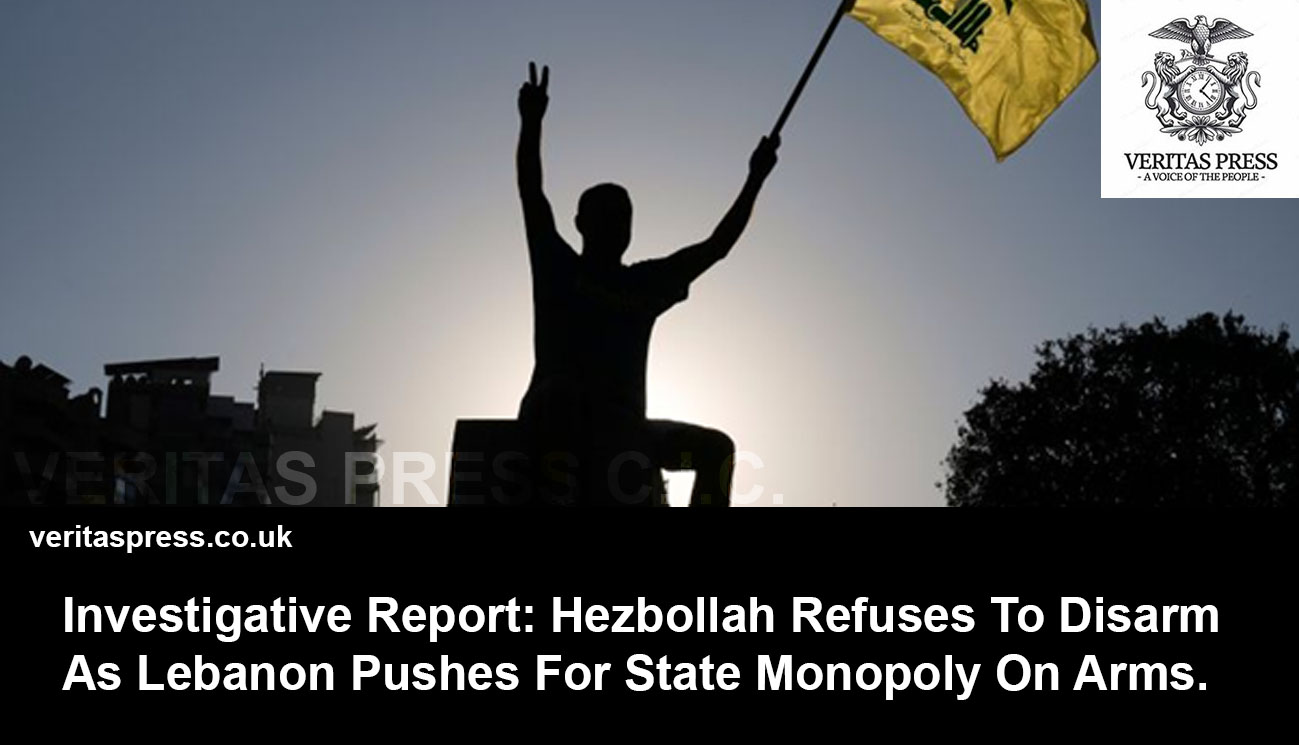Press Release: Veritas Press C.I.C.
Author: Kamran Faqir
Article Date Published: 06 Aug 2025 at 14:50 GMT
Category: Middle East | Lebanon | US-Israel At War
Source(s): Veritas Press C.I.C. | Multi News Agencies
Overview: Day 669 Of Netanyahu’s Gaza Campaign & Growing Pressure On Hezbollah
Against the backdrop of Israel’s continued military campaign in Gaza and tentative talks of full occupation, Lebanon’s internal crisis over Hezbollah’s weaponry has intensified. On August 5, 2025, Hezbollah Secretary-General Naim Qassem delivered a forceful televised address rejecting calls for disarmament, setting off alarm bells within the Lebanese government and among international mediators.
Qassem’s Defiant Message: “No Surrender, No Compromise”
Hezbollah’s new leader did not mince words:
- “Threats don’t work with us, we will not hand over our weapons to Israel,” Qassem declared during Ashoura commemorations in Beirut’s southern suburbs.
- He insisted that weapons are an “internal Lebanese matter” detached from Israeli demands: “Those calling for disarmament demand submission to Israel” and serve its strategic interests, not Lebanon’s security.
He positioned Hezbollah’s arsenal as a shield against what he called escalating Israeli expansion:
“Discussions about weapons are internal; Israel has no role in overseeing or dictating terms. We won’t allow disarming the resistance”.
Lebanon’s Leadership Response And Political Pushback:
A robust state-led counter-pressure has emerged:
- On August 6, PM Nawaf Salam officially tasked the army to draft a plan, due by the end of August, to monopolise arms by the end of 2025. This was the first time the Cabinet formally addressed Hezbollah’s weapons.
- President Joseph Aoun labelled Hezbollah’s weapons a legacy incompatible with a modern sovereign state, calling the Cabinet’s move a historical necessity for restoring authority and reconstruction.
Yet Hezbollah-allied ministers exited the meeting in protest, calling the Cabinet’s decision a “grave sin” and accusing the government of capitulating to U.S. dictates.
Voices From Lebanon: Tensions And Fears Of Civil Strife.
Locals and analysts paint a dire picture:
- Hezbollah supporters in Beirut rallied, warning disarmament may destabilise Shia political representation and uproot their communal security.
- Activists and Al Jazeera’s Zeina Khodr, reporting from the capital, noted:
“Hezbollah feels blackmailed; if they don’t disarm, no reconstruction funds will follow”.
Analysts raised fears of sectarian backlash if disarmament is forcibly pursued:
- MP Samir Geagea argued Hezbollah has set Lebanon back “a hundred years,” highlighting damage to state institutions.
Lebanese MPs offered cautious support for eventual centralisation:
- Elias Hankash suggested a forced arm transfer might be preferable if necessary for sovereignty, though acknowledging all prior efforts sought to avoid clashes.
Cease‑Fire Reality: Occupation Continues While Diplomacy Stalls.
Despite a November 2024 cease-fire, multiple conditions remain unmet:
- Israel still occupies five strategic outposts in southern Lebanon and conducts near-daily air strikes, while Lebanese forces reach only dozens of Hezbollah depots.
- Hezbollah maintains it fulfilled its obligations south of the Litani River, pointing out that Israel has violated the cease-fire thousands of times.
International Mediation: Aid Levers And Security Trade-Offs.
Foreign actors continue to shape the debate:
- U.S. envoy Tom Barrack has pushed a proposal requiring Hezbollah to disarm within months, in return for Israeli withdrawal and international reconstruction aid; Hezbollah denounces it as serving only Israeli and U.S. agendas.
- International media and analysts, including a New Yorker feature, underline the fragile balance between donor conditions, Lebanese state capacity, and Hezbollah’s entrenched institutional power post-war.
Power, Paradox And The Road Ahead:
With Day 669 of Netanyahu’s Gaza campaign unfolding, whispers of full occupation risk inflaming tensions on Lebanon’s border. Hezbollah vows to retaliate if Israel escalates southward, warning missile strikes would dismantle Israel’s hard-won security in under an hour, a sign of continued deterrence reliance.
Yet, Lebanon’s fragile government, shell-shocked by conflict, economic collapse, and political vacuum, is pressing ahead. The Cabinet’s disarmament timetable signals a hard pivot to centralise power under state institutions.
Analysis: The Core Conflict Beyond Weapons.
At its heart, Lebanon faces a dilemma beyond arms:
- Security vs. Sovereignty: For Hezbollah, weapons symbolise national defence honour; for government leaders and opposition, they represent a parallel authority undermining a unified state.
- Dialogue vs. Force: President Aoun’s reiteration of negotiation reflects concern over historic sectarian flashpoints, such as the 2008 telecommunication clash, but Cabinet pressure suggests willingness to escalate.
- Aid Leverage vs. Autonomy: Hezbollah alleges reconstruction funding is being held hostage to disarmament compliance; critics argue sovereignty won’t be rebuilt upon paramilitary rule.
Conclusion: Lebanon At The Crossroads Of Sovereignty And Subjugation.
As Lebanon teeters on the edge of another internal rupture, the standoff over Hezbollah’s arms reveals more than just a question of security; it lays bare the fragility of a nation grappling with occupation, external manipulation, and internal paralysis. The government’s sudden push to reassert control over all weapons may seem like a long-overdue step toward national sovereignty. Yet beneath the surface lies a volatile gamble: that an already weakened state can forcibly dismantle a deeply embedded militia without reigniting sectarian violence or collapsing the delicate balance of power.
Hezbollah’s defiance is not merely rhetorical. The group remains a powerful actor with strong grassroots backing in Lebanon’s Shia heartland, a vast patronage network, and entrenched positions within the political, security, and social fabric of the country. It views the disarmament agenda, especially under U.S. and Israeli pressure, as an existential threat, not only to its arsenal but to its legitimacy.
What’s most alarming is the growing perception among locals, analysts, and even some officials that Lebanon’s sovereignty is now being negotiated not in Beirut, but in Washington and Tel Aviv. As one political analyst in Beirut told Al Jazeera, “This isn’t about disarmament, it’s about domination. If Hezbollah disarms under fire, who decides what Lebanon’s independence looks like? Certainly not the Lebanese.”
Meanwhile, Israel’s ongoing occupation of southern border outposts, in direct violation of the November ceasefire, undermines the moral high ground of those calling for Hezbollah to disarm. It feeds a dangerous narrative that Lebanon is being asked to relinquish its only deterrent while its territory remains under hostile military control.
There is a real risk that Lebanon, already battered by war, economic collapse, and mass displacement, will be thrust into another phase of violent fragmentation if this disarmament process is pursued without consensus, accountability, and guarantees of national protection. And yet, the alternative, maintaining a state within a state, a military force outside democratic oversight, is equally untenable.
The challenge, then, is not simply whether Hezbollah should lay down its arms. The deeper question is whether Lebanon can reclaim its sovereignty, not just from armed militias, but from all forces, foreign and domestic, especially from Israel, that have long treated it as a battleground for regional wars. Without a truly national roadmap, rooted in justice, inclusivity, and independence from foreign coercion, disarmament may prove not a path to peace, but the spark of Lebanon’s next disaster.
Tags:




























Leave a Reply